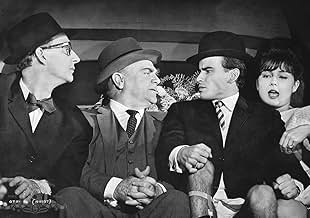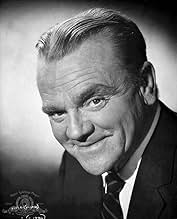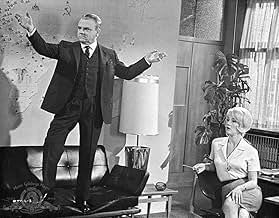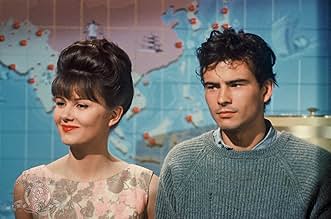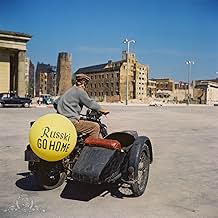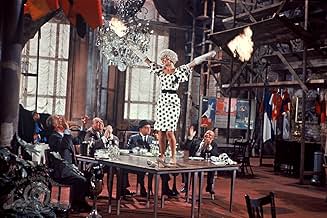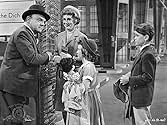In Westberlin zu Zeiten des Kalten Krieges bekommt ein führender Coca-Cola-Angestellter den Auftrag, die schicke und verwöhnte Tochter seines Chefs zu betreuen.In Westberlin zu Zeiten des Kalten Krieges bekommt ein führender Coca-Cola-Angestellter den Auftrag, die schicke und verwöhnte Tochter seines Chefs zu betreuen.In Westberlin zu Zeiten des Kalten Krieges bekommt ein führender Coca-Cola-Angestellter den Auftrag, die schicke und verwöhnte Tochter seines Chefs zu betreuen.
- Regie
- Drehbuch
- Hauptbesetzung
- Für 1 Oscar nominiert
- 1 Gewinn & 8 Nominierungen insgesamt
- Fräulein Ingeborg
- (as Lilo Pulver)
- Melanie Hazeltine
- (as Lois Bolton)
- Krause
- (Synchronisation)
- …
- Cindy MacNamara
- (Nicht genannt)
Empfohlene Bewertungen
But for a dessert, it's still 'rich' enough to be enjoyed with its machine-gun dialogues worthy of Hawks and Cukor' classics that makes you wonder if you didn't accidentally fast-forward the film at 1.5 speed. And there is such vaudevillian streak of incongruous events and improbable coincidence that it provides the right canvas for safe hilarity, in other words so many things happen in the film that even the lousiest gag doesn't have time to fall flat, another comes at the rescue. And as Coca-Cola executive McNamara, James Cagney delivers a painstakingly energetic performance that exhausted him so much he retired from acting for 20 years until his cameo in "Ragtime", that's how demanding his role was... and you can feel it in the screen.
Cagney didn't get along with Horst Bucholz who plays Otto the young idealist communist who marries the Coca Cola's top man's daughter (Pamela Tiffin) and wished he could kick his ass to calm down his scene-stealing impulses. These incidences reminded me of Fonda not getting along with Ford during the shooting of "Mister Roberts", starring Cagney as well, but that didn't affect the film since it's all meant to be a big joke and in the scenery-chewing contest, Cagney and Bucholz are equally hammy and funny if you look at the film with indulgent eyes. Maybe Cagney was too old and Jack Lemmon would have been a more fitting choice as a middle-aged executive in one of the most emblematic American brands. We'll never know.
The real problem in "One, Two, Three" is that it starts brilliantly, the whole first act where we see "Mac" handling Germans' manners and double-edged efficiency draws a pattern of cultural clashes' gags that found an echo in both the Cold War context and the difference of mentalities between America and the European world, as if there was a second curtain behind the infamous iron one (though much lighter). But even if if the non-existence of the Berlin wall (only mentioned at the beginning) dates the film, made ironically the exact year of its building, the film also managed to be ahead of its time prophesizing the missiles crisis with a Russian executive saying about Cuban, "they give us cigars, we give them missiles".
The dialogues with the Soviet representatives are nothing short of brilliant writing, reminding us of the wit that Wilder displayed when he wrote "Ninothcka", a film whose comedic efficiency also depend on a funny Soviet trio. The comment about the Swiss cheese being rejected because it had holes had me in tears, to name that one. The plot thickens to the point of convolution when it adds the romantic subplot but it makes up for the blandness of the two lovers (no matter how colorful they're made to be) when it adds another dimension of cultural shift between Southerners and Yankees, the flimsy Southern belle didn't realize the political meaning of "Yankee, go home" slogan nor what a house "with a short walk to the bathroom" implied.
But the best asset the film has to offer is its slice of life from both sides of the Iron curtain or the soon-to-be Berlin wall. For all the antagonism directed against US capitalism, there might be one thing no one can resist which is a bottle of Coca-Cola, the brand that perhaps sold the American dream more than any political operation. So watching Cagney playing diplomacy with the Russian provided the film's best moments culminating with that unforgettable Sabre Dance and barefeet Fraulein Ingebörg frenetically shaking her voluptuous body on a restaurant table in front of executives getting an exciting taste of the Western dream. That musical sequence might be one of my favorite from any Wilder films and it's crucially set at mid-point just when the plot started to drag.
As I said, Horst Bucholz was hammy only to the degree that it was the only possible way to go the distance with Cagney and I enjoyed watching the lovable Arlene Francis playing his resigned but not discouraged wife. Yet the film is so busy providing one liners right after another that it takes the safe side and injects lousy wedding-and-divorce segments where so much could have been done in the area of politics. But maybe Wilder was getting too old-fashioned leaving sharper tones to a certain Cold-War comedy directed by Stanley Kubrick, interestingly a movie that also pays a tribute to Coca Cola through one of its most memorable scenes. That level of wit is missing in the film already dated by its own context. One thing to its defense though, it offers the perfect response to Joan Crawford's complain of product placement and the perfect punchline with Pepsi Cola having the last word.
And to give a last word, if the film isn't in the same league that "Some Like it Hot" and "The Apartment" and marks the decline of Wilder's prestige and awards pretensions, it still works and maybe it does so because somewhere I could feel it didn't pretend to be anything but a farce and comedy of manners with the Cold War as the backdrop. A "Dr. Strangelove" it isn't but either you don't find it funny or you do. I did find it funny many times and brilliant in a few scenes.
It's one of those movies in which the gags would be spoiled if they were described to a person who hadn't yet seen the film. For the most part they are tied closely to the plot and often build on one another. But I'm compelled to give one example. Cagney is an executive in Berlin and his first-hand man is Schlemmer. Schlemmer has a habit of clicking his heels before and after addressing Cagney. At one point Cagney chews him out and asks him, "just between us," what Schlemmer did in the war. "I was in the underground," says Schlemmer. "Oh, the resistance?" "No, the underground. The subway. I was a conductor." Cagney says supiciously, "And I suppose you never were a supporter of Adolf." Schlemmer: "Adolf who? You see, I was always in the underground. They never told us anything down there."
The dialogue is shouted rather than spoken. Heels are clicked, people leap to attention, fingers are snapped, orders are flung about. The only person who doesn't run around frantically is Lilo Pulver who does not have to run to attract anyone's attention. She can simply stand still and get the job done. She's Cagney's secretary and tells him she's thinking of getting a job elsewhere as a translator. "Don't forget I am bilingual." "Don't I know it," Cagney mutters ruefully.
But I won't go on because I'll just wind up giving away more gags. Check the trivia entries too. This was Cagney's last major role and one of Wilder's best comedies. It's simply hilarious and not to be missed.
For what was and what should have remained his swan song to the world of film James Cagney heads the cast in this. He's the man in charge of Coca-Cola's operations in Germany which is headquartered in West Berlin and he's had a lovely little present dumped in his lap. The daughter of the CEO of Coca-Cola is in Europe and now she's in Germany and he's expected to watch out for her. The daughter is played by Pamela Tiffin and she is one of the biggest airheads ever portrayed on the screen. She's fallen big time for a German kid played by Horst Bucholtz. They've gotten married.
Bucholtz is a kid who's real good at spouting all kinds of left wing slogans without delving to deeply into their meanings. He's a Communist and that drives Cagney nuts and if it drives Cagney nuts, Tiffin's father is sure to go over the top. Cagney takes it upon himself to get Bucholtz arrested on the East Berlin side as an American spy.
Of course a small memento of their married life has developed inside Tiffin so now Cagney has a real problem. He's got to get Bucholtz back and turn him into a money grubbing capitalist in his image. The frantic pace at which this is attempted, racing against the clock when Tiffin's father played by Howard St. John arrives in Berlin is what the rest of the film is about.
Wilder has a ball reducing the Cold War to its basic absurdities. The USA is symbolized by James Cagney who thinks the whole world will become America if only enough Coca-Cola is peddled. Cagney comes real close to proving it so.
The Communists come out far worse. Karl Marx's world always looked nice on paper, but always has had a real problem being converted into a functioning state. The Russians are also good at spouting the party line, but in One, Two, Three, Wilder shows how very easily they can be influenced by some of life's most elemental things and I don't mean Coca-Cola.
Cagney did not always get along with Wilder, but both men were professional enough to bury certain creative differences. Cagney was kind and patient with Tiffin who was getting her first real break in film. However he grew to positively loath Horst Bucholtz. In his memoirs which came out in the 1970s, Bucholtz was the only colleague who Cagney had anything really critical to say about.
During the middle of the film being shot, the Russians stopped the flow of traffic from West and East Berlin. Some shots had to be redone around the Brandenburg Gate, a whole set had to be constructed. I suppose a well trained cinema professional could spot the shots where the real and the fake Brandeburg were used. I sure can't. The following year, the Berlin Wall was built, so Wilder got his film done just in time.
Arlene Francis plays Cagney's exasperated wife and she of What's My Line does just fine. Cagney made an appearance on that show just before shooting started and gave the picture a big old plug.
The laughs come pretty fast and furious as James Cagney struggles mightily to prevent the arrival of "another bouncing, baby, Bolshevik."
Billy Wilder's "One Two Three" is one of the greatest comedy films ever made. This wonderfully zany 1961 gem is a lightning-paced, hysterical farce (and with it's classic instrumental theme of "The Sabre Dance," you know you're in for a rollicking, rapid-fire comedy). Based on a French play, much of the movie plays out like a stage comedy, as Wilder simply turns his camera on the actors and lets them do their thing. The entire cast is simply superb, their comic timing perfect. James Cagney gives one of his all-time greatest performances as C.R. MacNamara. In almost every scene, with the bulk of the script on his shoulders, Cagney is sharp, quick on the draw, and just plain hilarious as the bewildered executive. Arlene Francis lends fine comic support as Cagney's sarcastic wife, Horst Buchholz is very funny & perfectly cast as the rebellious Otto, and the gorgeous Pamela Tiffin is simply a riot as the hot-blodded, dim-witted Scarlett. But ALL the actors in this movie are funny & terrific. Billy Wilder's direction is marvelous, and his script co-written with I.A.L. Diamond is clever and hilarious.
Some may find the quick pace of "One Two Three" a little exhausting, as the movie's energy level remains high from beginning to end, rarely stopping for air, but it works for me. This movie is pure farce, plain and simple. It makes no apologies for what it is, and it's goal is to make you laugh loudly. "One Two Three" is one of the most hysterical movies I've ever seen in my life, and it never fails to give me bellylaughs. Thank you Billy, Jimmy, and all the rest for this magnificent comedy gem.
Wusstest du schon
- WissenswertesThe film recorded a loss of $1.6 million. It didn't do well at either the U.S. or German box office because the story felt much more sinister in 1961 when the Berlin Wall was erected.
- PatzerSchlemmer calls his former superior officer in the SS "Herr Oberleutnant". The SS had no rank of Oberleutnant nor did its members call each other Herr. Oberleutnant was a German Army rank. The corresponding SS rank was Obersturmführer. In the German (dubbed) version, Schlemmer correctly addresses him as "Obersturmführer".
- Zitate
Borodenko: When will papers be ready?
C.R. Macnamara: I'll put my secretary right to work on it.
Mishkin: Your secretary? She's that blonde lady?
C.R. Macnamara: That's the one.
Peripetchikoff: [after conferring with the others] You will send papers to East Berlin with blonde lady in triplicate.
C.R. Macnamara: You want the papers in triplicate, or the blonde in triplicate?
Peripetchikoff: See what you can do.
- VerbindungenEdited into Grand format: Amerika made in Hollywood (2006)
Top-Auswahl
Details
Box Office
- Budget
- 3.000.000 $ (geschätzt)
- Weltweiter Bruttoertrag
- 146 $
- Laufzeit
- 1 Std. 44 Min.(104 min)
- Farbe
- Seitenverhältnis
- 2.35 : 1


